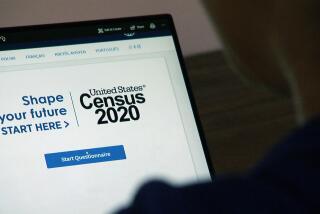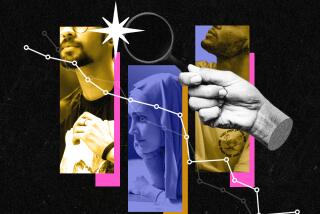No Need for 57 Census Varieties
- Share via
The revelation that there is difficulty interpreting the newly recognized 57 multiethnic categories of the 2000 census simply reinforces how unconcerned the U.S. is about rectifying past wrongs committed among racial lines.
The collection of this invalid and confusing ethnic data serves conservative political motivations rather than cultural pluralism. Affirmative action and other race-based programs become difficult to monitor, legislate, and interpret with this convoluted data. Eurocentric Americans who oppose reparations for historically oppressed groups can count this new census data as a victory.
We should not “beat around the (George) bush” by pretending that this transparent attempt to pass off racism as multicultural acceptance is a good thing for American society. These 57 census groups simply water down ethnic communities that have gained some degree of political power. Why are Germans who mix with Italians, who mix with Russians, who mix with British all considered “white” on the census? These multiethnic Americans of lighter hues have one category from which to choose and constitute one large voting bloc. Meanwhile, multiethnic Americans of darker hues are asked to divvy up 57 ways.
For example, I am African American and have always identified myself as such. Both my parents identified themselves the same way. However, if I were to get technical--as the census invites me to get--I would have to check the box that said “white, black, American Indian and Alaska native.”
Although the white in my bloodline extends from slavery via non-consensual sex, white is still evident in my skin tone. Did the census mean to count that or only count more recent consensual interracial marriages? Do “blacks” have to have a close white relative, be raised by one, or simply embrace everyone who has contributed to their genetic makeup in order to qualify for the “white-black” box?
The lack of clarity on this question makes the data collected invalid for the purpose of drawing conclusions. However, it will succeed at destroying ethnic community voting blocs.
My great-grandfather was a full-blooded Native American. Will I qualify for more services if I claim him even though I don’t know his culture? I doubt it.
Modern political and economic forecasting is done through socio-economic lines more so than racial lines in today’s culture. Perhaps we should abandon race identification altogether and inquire only about religion, education and income levels, all of which give us equally important information without race-baiting.
Until the government clarifies the political need for these new 57 categories, all ethnic groups should continue to identify with the established traditional race categories.
Whites are not asked to divide their community into 57 multiethnic groups to better represent their diversity, so minority groups should not be asked to do so either.
More to Read
Sign up for Essential California
The most important California stories and recommendations in your inbox every morning.
You may occasionally receive promotional content from the Los Angeles Times.










